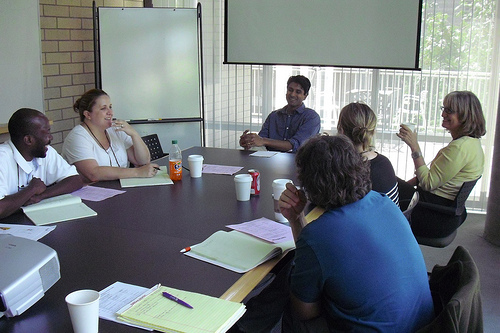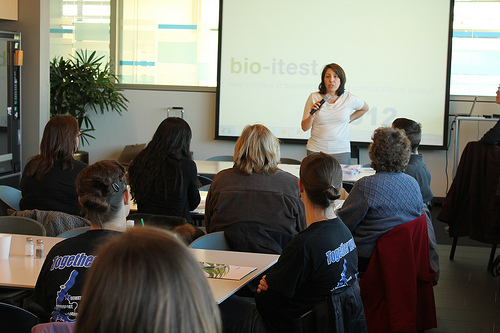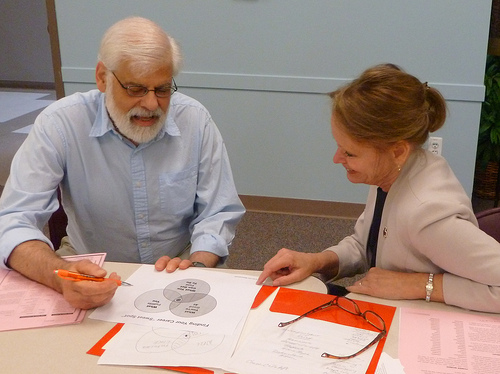When and Why You’ll Want to Pay People to Help You Write

Image from Flickr by Images_of_Money.
Should you pay for help with your writing? And when in your career should you do so? These can be really tough questions to face. After all, you probably want to make money rather than spend it. Unless you’re already a well-established writer, chances are you’re not making much from your writing and you’re relying on a day job to make up the difference. Yet, without investing at least a bit of money, you’ll probably find it tough to make any progress at all. Here’s what I’d suggest you spend your money on, from cheapest to most expensive, in order to produce the best work you’re capable of. Quick note: I’m only covering the writing/editing stage here, so I’m not looking at people who can help you publish (book formatters, cover designers) or people who can help you market your published book. I’ll get to that in a future post!Should You Wait Until You’re Already Making Money?
It’s tempting – and on the surface, seems very sensible – to tell yourself that you won’t spend money until you’re making some. I was struck by Joanna Penn’s reply in this Q&A podcast in response to a writer asking about self-editing and saying “It is difficult for me to spend several thousand dollars only to end up with a book that might only sell a dozen copies.” She pointed out that most of us spend money on hobbies – perhaps on special equipment, on membership fees, on magazines, books, even conventions related to our hobbies. And we don’t see anything wrong with that. (Side note: I don’t think editing has to run to several thousand dollars, though you might well be looking at a thousand.) If writing is important to you – not just a hobby, but something that really brings you alive, something you want to take further in the future – then it’s perfectly reasonable to spend some money on it … whatever stage you’re at. Of course, you may be in a position where you don’t have much to spend. Perhaps your day job doesn’t pay well, or you have dependents, or you’re still in school or at university. Below, I’ve listed several ways to spend money to boost your writing skills or to improve your current manuscript’s chances: I’ve started with the cheapest, so even if you can’t afford much, these are hopefully within reach. Where appropriate, I’ve also suggested alternative free/cheaper options throughout.#1: Writers’ Group

Image from Flickr by NWABR.
Cost: Varies. Likely to be around $2 – $10 per session, depending on what your group offers (e.g. if they have a paid speaker / teacher). Some groups, meeting in writers’ homes, may be free or virtually free – e.g. members take it in turns to bring tea/coffee and biscuits. Why join one: Although professional editing is important when you have a finished manuscript (see #4), one of the best ways to improve your work-in-progress is to be part of a workshopping group – one where members offer feedback on one another’s work. Many writers also find their writers’ group a hugely valuable source of support, encouragement, and accountability. Simply having to produce something new for each meeting can help you stay on track. When to join: As soon as you like! Look for a local group, or consider starting your own. If you don’t have much experience yet, try joining a tutor-led class or course first (see #2) – this is a great way to meet other newish writers. Free alternative: Join an online writers’ group, or find a writing buddy to swap work with. This will give you many of the benefits of a “real life” group – though you may find it harder to stick to swapping work regularly.#2: Writing Course

Image from Flickr by NWABR.
Cost: Depends on the length of the course, the subject matter, and the tutor’s experience. You’re probably looking at something like $50 for half a day and $100 for a full-day course; it may be cheaper per session to take an evening course that runs for several weeks. Why join one: A writing class is a great way to develop a particular skill: most classes will focus on a specific aspect of writing. It can also be a good way to meet other writers, to get a bit more serious about your writing, and (if life is hectic) to force yourself to set aside some time for writing! The types of course available vary hugely: my writer friend (and invaluable editor) Lorna Fergusson runs single afternoon courses on specific topics, for instance; at the other end of the scale, you can go on writing holidays like Skyros or residential courses like the ones from the Arvon Foundation. When to join: As soon as you can! There are plenty of writing courses aimed at beginners, and many more general ones that cater for writers with varying levels of experience. Find out what’s available in your area, and book something in the next month or two. If you’ve not written for some time, definitely try to do a course (however short) – it’s a great way to get back into writing quickly! Cheap alternative: If a writing course is out of reach financially (or practically), try online courses – some are quite pricy but others are completely free – like my On Track course that’s designed to help you get going again with a writing project. Try books on writing, too – there are hundreds available covering all sorts of topics. I particularly like Nigel Watts’ Writing a Novel (Amazon.com / Amazon.co.uk), which includes writing exercises to help you put into practice what you’re reading about.#3: Mentor or Coach

Image from Flickr by Tatiana12.
Cost: An hourly rate. I used to charge $79/hour when I offered writing coaching, which is on the low end of the scale. Many mentors/coaches will offer a slightly lower hourly rate if you book multiple sessions at once. Why get one: A mentor or writing coach can provide encouragement and support as well as editorial assistance with your work in progress. They may be able to give you advice that goes beyond your writing itself – e.g. on business matters, or on time management. Unless you have a lot of spare cash, hiring a mentor/coach probably isn’t something you’ll do for a long period of time – but a couple of sessions could help you get some work to publishable standard and give you greater confidence to move forwards alone. When to get one: Mentors and coaches can help at any stage, but since hiring one is pricy, I’d definitely suggest waiting until you’ve tried out a writing group or writing class first, and gained some experience from that. A great time to hire a mentor or coach is when you have a clear goal in mind – like finishing the draft of your first novel, or getting your first few clients as a freelancer. You may find that just a couple of sessions are enough to give you a real boost. Cheap/free alternative: Partner up with another writer for accountability and support. You might choose to offer one another feedback on your works in progress, or you might simply “check in” with one another each week to briefly state what you’ve achieved (e.g. words written, pages edited). Note: While some writers might suggest you should look for someone who can mentor you for free, most authors won’t have the time to do so – even if they’d love to help you.#4: Professional Editor or Proofreader

Image from Flickr by sidewalk flying.
Cost: Substantial, if they’re reviewing a whole manuscript – it could easily run to $1000 or more. Why get one: If you talk to any successful self-published author, chances are they’ll tell you just how crucial professional editing is. Paying for editing may well make the difference between a so-so book with some significant flaws, and a really good book that readers love. There are different levels of editing: some editors will give you overall feedback and suggested changes to make to the plot, characters or pacing; others will do a “close edit” or “line edit” where they suggest words to cut or change and sentences to rework. You might choose to have a big picture edit followed by a detailed edit once you’ve made changes, though obviously this gets pricy! Many editors will be happy to do both at once. Proofreaders look for spelling and grammatical mistakes: they may pick up on slightly broader issues if they notice them (e.g. “Your character changes eye colour part way through the novel”) but they’re unlikely to make editorial-style suggestions. When to get one: After you’ve revised and edited your manuscript yourself, and once you’ve had feedback from other people (e.g. fellow writers in a writers’ group or beta-readers). If you’re self-publishing, definitely get an editor before putting your book out there in the world. (If you have already published a book that could’ve done with more editing, you’ll find out from the reviews! You can always unpublish it, get it fully edited, and publish a revised edition.) If you’re aiming to get an agent, then it’s also worth paying for a full edit beforehand. If you can’t afford that, at least get an editor to do a close edit of your synopsis and first three chapters – since that’s what you’ll be sending to the agent. Cheap/free alternative: Give your work to beta-readers, who’ll read through and make comments. You won’t get the same level of feedback that you’d receive from an editor, and beta-readers won’t be trained professionals (though they’ll likely be avid readers)! Some beta readers charge, others don’t: you may want to at least give them something as a “thanks”. Pay for a professional edit of the first three chapters of your book – especially if you’ll be submitting these chapters to agents/publishers. Go through the edits thoughtfully, asking yourself why each change was suggested – this can be a huge help when you self-edit the rest of your manuscript. Whatever stage you’re at with your writing, it’s worth putting aside a bit of money to help you go further, faster. If that’s really going to be a struggle for you, do try some of the free/cheap options above – obviously you’re not going to get quite so much out of them, but they can still give your writing a huge boost. I’d love to hear your experiences of paying for writing help, or of swapping support, feedback and editing with other writers. Just pop a comment below to tell us what worked (or didn’t!) for you.About

I’m Ali Luke, and I live in Leeds in the UK with my husband and two children.
Aliventures is where I help you master the art, craft and business of writing.
Start Here
If you're new, welcome! These posts are good ones to start with:
Can You Call Yourself a “Writer” if You’re Not Currently Writing?
The Three Stages of Editing (and Nine Handy Do-it-Yourself Tips)
My Novels

My contemporary fantasy trilogy is available from Amazon. The books follow on from one another, so read Lycopolis first.
You can buy them all from Amazon, or read them FREE in Kindle Unlimited.

Hi Ali,
Great information in this post. I like your analogy about spending money on hobbies (or vacations). In my experience, if someone wants to become a professional writer, they can’t afford not to spend money on professional services – especially editing.
Professional editing and professional cover design would be my two must-haves (I got lucky with my covers and have a brilliant friend who does them — I do her web hosting in return)!
Hey Ali, great topic! Do you have any thoughts/ recommendations on when it’s best to hire a mentor?
Whoops, sorry Margaret, I thought I’d replied to this. I’ve updated the post now with a section on that (meant to put it in originally … must’ve got interrupted by a small person!)
Excellent! Thanks for the update. 🙂
Margaret Pinard’s last blog post ..From the Travels: Blue Sky Thinking
Great post Ali,
You have to speculate to accumulate isn’t that what they say? Some brilliant ideas.
What do you think about writers conferences? A good investment perhaps for finding out what is happening in the industry? Networking etc?
Good question! I’ve really enjoyed the conferences I’ve been to, mainly for the lectures/talks (and the inevitable inspiration and encouragement that comes from being around lots of writers for an extended period of time).
With networking, you obviously tend to get out what you put in — I need to get better at going up to people and saying hi!
Some in the UK (Winchester and York, that I know of) offer one-to-one agent sessions, which is a brilliant opportunity to get industry feedback on your work — and I know some authors have gone on to get book deals directly as a result of these.
I think they’re well worth doing, probably when you’re at the stage of having written a reasonable amount (e.g. a few short stories or articles, maybe completed the first or second draft of a novel).
Thank Ali For this Great and Strong Information, in my opinion i think that writing is gift from god.
Ahmed’s last blog post ..How to Become Rich Overnight – 6 Proven Ways to get Rich Fast